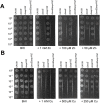ZccE is a Novel P-type ATPase That Protects Streptococcus mutans Against Zinc Intoxication
- PMID: 35939512
- PMCID: PMC9387928
- DOI: 10.1371/journal.ppat.1010477
ZccE is a Novel P-type ATPase That Protects Streptococcus mutans Against Zinc Intoxication
Abstract
Zinc is a trace metal that is essential to all forms of life, but that becomes toxic at high concentrations. Because it has both antimicrobial and anti-inflammatory properties and low toxicity to mammalian cells, zinc has been used as a therapeutic agent for centuries to treat a variety of infectious and non-infectious conditions. While the usefulness of zinc-based therapies in caries prevention is controversial, zinc is incorporated into toothpaste and mouthwash formulations to prevent gingivitis and halitosis. Despite this widespread use of zinc in oral healthcare, the mechanisms that allow Streptococcus mutans, a keystone pathogen in dental caries and prevalent etiological agent of infective endocarditis, to overcome zinc toxicity are largely unknown. Here, we discovered that S. mutans is inherently more tolerant to high zinc stress than all other species of streptococci tested, including commensal streptococci associated with oral health. Using a transcriptome approach, we uncovered several potential strategies utilized by S. mutans to overcome zinc toxicity. Among them, we identified a previously uncharacterized P-type ATPase transporter and cognate transcriptional regulator, which we named ZccE and ZccR respectively, as responsible for the remarkable high zinc tolerance of S. mutans. In addition to zinc, we found that ZccE, which was found to be unique to S. mutans strains, mediates tolerance to at least three additional metal ions, namely cadmium, cobalt, and copper. Loss of the ability to maintain zinc homeostasis when exposed to high zinc stress severely disturbed zinc:manganese ratios, leading to heightened peroxide sensitivity that was alleviated by manganese supplementation. Finally, we showed that the ability of the ΔzccE strain to stably colonize the rat tooth surface after topical zinc treatment was significantly impaired, providing proof of concept that ZccE and ZccR are suitable targets for the development of antimicrobial therapies specifically tailored to kill S. mutans.
Conflict of interest statement
The authors have declared that no competing interests exist.
Figures











References
Publication types
MeSH terms
Substances
Grants and funding
LinkOut - more resources
Full Text Sources
Medical

